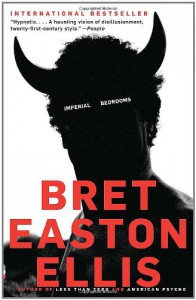Imperial Bedrooms (Vintage Contemporaries)

I wasn't sure what to expect from 'Imperial Bedrooms'. Bret Easton Ellis' previous novel 'Lunar Park' had exploded all of his past work in extraordinary fashion. And before 'Lunar Park' each of his books had been more stylistically complex, bigger and grander somehow - 'The Informers' is not an exception as it had been written about the same time as 'Less Than Zero'. It would seem that the slate had been wiped clean.
Ellis seems to have had other ideas and unfinished business with his first literary alter ego, Clay.
I love 'Less Than Zero', even though I had nothing on the surface in common with these bored spoiled monsters, I recognized them and felt a kinship in the feeling underlying the admittedly thin story. Finishing 'Zero' I had the same feeling of awe I had when I finished 'The Great Gatsby'. Stop your judging--I'm serious. When I heard that 'Imperial Bedrooms' was going to be a sequel I was skeptical.
Soon after my brows came down on that fact, my sister brought home an issue of Interview Magazine that had an interview with Ellis. In it he was so abruptly dismissive of nostalgic sentiment towards Zero or its characters (such as when the interviewer wondered if Clay would ever find happiness) that I became hopeful. His talk about it coming from a "dark" period in his life after a recent relocation to L.A. and other factors won me over, as was the point I suppose. But, maybe, I thought, there was something left to say after all.
Well, there is and there isn't. 'Imperial Bedrooms' starts with "They made a movie about us." Clay reveals that the movie Less Than Zero and the novel were both lightly fictionalized events written up by a member of their group. The events did happen, but tensions over Blair led the spiteful author to make Clay the "handsome and dazed narrator, incapable of love or kindness." Clay might not be deserving of our sympathy, though. From the moment he arrives back in L.A. at the start of the novel, again around Christmastime, we see immediate discrepancies between the picture he gave us and how he acts. With that meta/postmodern conceit in place this book evokes the flat style of 'Zero' and updates the ennui of his characters, much how Douglas Coupland does, by showing how modern technology isolates people as much as it brings them together.
The problems with 'Bedrooms' are really with the story itself. Ellis has had some mixed success by using genre-writing techniques (the creepy 'Lunar Park' and the conspiracy-filled 'Glamorama'), but while the thriller (thrillesque?, thrillisms?) dialogue like "This is bigger than you" are somehow more ridiculous coming out of Trent or Rip or Blair than out of the mouths of the supermodels of 'Glamorama'. I just never felt any of the tension, even as Clay got more and more paranoid. Also, what I'll call the "Palm Springs Interlude" went right over my head. Was it there to show the state of Clay's descent or to reveal how he was all along? The use of a copy of 'Less Than Zero' intrigued me, but ultimately it seemed like a dead-end.
There is something to like here. The book isn't a total wash, but there doesn't seem to be enough. Other than Clay, the other characters are less dimensional then they were in 'Zero', and even he seems to be just treading water. I have no issue with books "about nothing", or unlikable characters, but they should have some overarching point to them. That nothingness should signify something. The book tries to explore Clay as a character, but he has the depth of a puddle. I don't know, when I read 'Less Than Zero' sometime in the future, I'll reread this and maybe come off with a better opinion. Most of Ellis' work has an "echo" effect on me, with each thought about it increasing my appreciation for what he's done. It's worked in reverse this time so far. In any case, it's a quick read and passes time.













